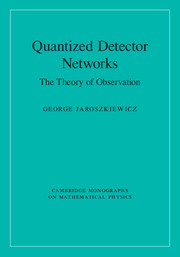Book contents
- Frontmatter
- Contents
- Preface
- Acronyms
- 1 Introduction
- 2 Questions and Answers
- 3 Classical Bits
- 4 Quantum Bits
- 5 Classical and Quantum Registers
- 6 Classical Register Mechanics
- 7 Quantum Register Dynamics
- 8 Partial Observations
- 9 Mixed States and POVMs
- 10 Double-Slit Experiments
- 11 Modules
- 12 Computerization and Computer Algebra
- 13 Interferometers
- 14 Quantum Eraser Experiments
- 15 Particle Decays
- 16 Nonlocality
- 17 Bell Inequalities
- 18 Change and Persistence
- 19 Temporal Correlations
- 20 The Franson Experiment
- 21 Self-intervening Networks
- 22 Separability and Entanglement
- 23 Causal Sets
- 24 Oscillators
- 25 Dynamical Theory of Observation
- 26 Conclusions
- Appendix
- References
- Index
23 - Causal Sets
Published online by Cambridge University Press: 24 November 2017
- Frontmatter
- Contents
- Preface
- Acronyms
- 1 Introduction
- 2 Questions and Answers
- 3 Classical Bits
- 4 Quantum Bits
- 5 Classical and Quantum Registers
- 6 Classical Register Mechanics
- 7 Quantum Register Dynamics
- 8 Partial Observations
- 9 Mixed States and POVMs
- 10 Double-Slit Experiments
- 11 Modules
- 12 Computerization and Computer Algebra
- 13 Interferometers
- 14 Quantum Eraser Experiments
- 15 Particle Decays
- 16 Nonlocality
- 17 Bell Inequalities
- 18 Change and Persistence
- 19 Temporal Correlations
- 20 The Franson Experiment
- 21 Self-intervening Networks
- 22 Separability and Entanglement
- 23 Causal Sets
- 24 Oscillators
- 25 Dynamical Theory of Observation
- 26 Conclusions
- Appendix
- References
- Index
Summary
Introduction
In this chapter we apply the concepts presented in Chapter 22 to a topic that has been of much theoretical interest in recent decades: causal set theory (CST).
It is interesting and useful to review the status of CST relative to other foundational topics in mathematical physics that have been and remain of prime significance to empirical physics, namely, special relativity (SR), general relativity (GR), and quantum mechanics (QM). Those great frameworks are built on foundations that presuppose the continuity of space and time.
Despite this, it is an empirical fact that we are surrounded by discreteness in the form of atoms, so it is natural to see how that discreteness fits in with the continuity of space and time. We have attempted in this book to show that the application of discrete principles to QM can go far beyond the basic Planck quantum of action. We have gone as far as discretizing empirical time, in the form of the stage concept. However, as far as relativity in either of its manifestations is concerned, the case for any form of discreteness has not yet been established empirically, although great efforts are being made in that direction in the program known as quantum gravity. We have particularly in mind the discretization approaches to GR of Regge (Regge, 1961) and Penrose (Penrose, 1971).
Regge's approach is a classically based discretization of the Riemannian manifold concept, so has at best a generalized propositional classification (GPC) of two. Penrose's spin network paradigm started as a quantum description of spacetime and has led to much work in the area of spin networks in the hope of unifying GR and QM. However, workers in spin networks and related branches of quantum gravity have focued their attention on the mathematical complexities and hardly any on the role of observers and their apparatus, leading to a GPC classification of quantum gravity as one, that is, as mathematical physics and not physics. Claims made that such programs represent empirical physics have not been empirically substantiated to date; quantum gravity at this time remains empirically vacuous, despite the best efforts of many theorists over many decades.
- Type
- Chapter
- Information
- Quantized Detector NetworksThe Theory of Observation, pp. 299 - 308Publisher: Cambridge University PressPrint publication year: 2017



